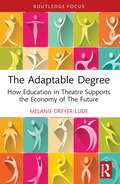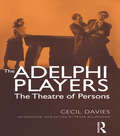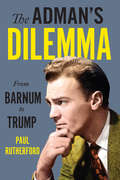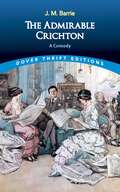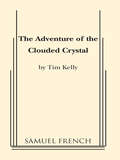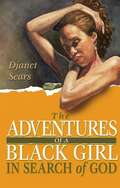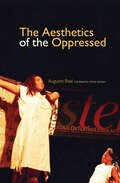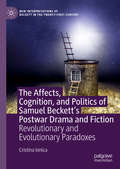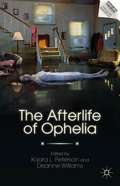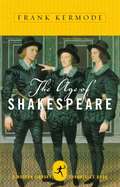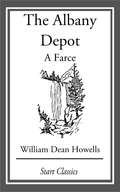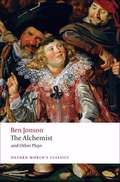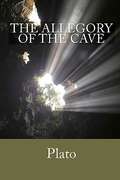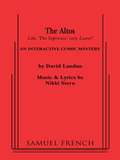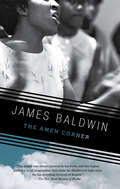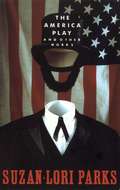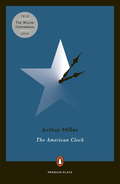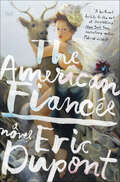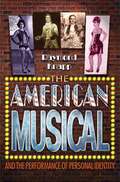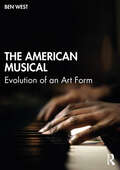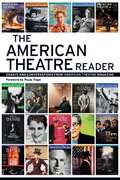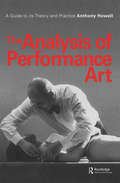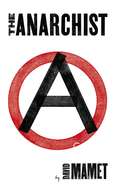- Table View
- List View
The Adaptable Degree: How Education in Theatre Supports the Economy of The Future (ISSN)
by Melanie Dreyer-LudeThis book utilized a mixed-methods research study of the career experiences of theatre graduates in the U.S. to provide data on employment patterns and job satisfaction.With a population of over 1,000 participants, this study examined where graduates were working, how their careers had changed over time, which skills acquired with their theatre degree were being used in current employment, and whether they believed their course of study was worth the financial investment, given their current circumstances. Evidence from this study revealed that a theatre degree provided many of the skills the employment market is currently seeking and that theatre graduates were gainfully employed in multiple sectors of the economy.This important data-based, field-specific information will aid chairs, deans, provosts, politicians, students and parents in deicision-making at a time when arts and humanities departments across the country are under the threat of elimination.
The Adelphi Players: The Theatre of Persons
by Dr Cecil DaviesCecil Davies' The Adelphi Players: The Theatre of Persons represents a uniquely interesting contribution to our understanding of touring British theatre in the mid-twentieth-century, post-war period. This book will interest everyone - whether student, academic or general reader - who wants to know more about issues concerning the recent history of British theatre. In their values and aims, the Adelphi Players pre-empted many of the post-war developments that we associate with the non-commercial, fringe and community theatre movement. In Richard Heron Ward founder of the Adelphi-Players, we encounter a dramatist, novelist, essayist and poet who has been unusually neglected in terms of our appreciation of the English literature of the broad left in the 1930s, `40s and `50s. The Adelphi Players has been edited by Peter Billingham, who has also provided an introduction placing Ward and the Adelphi players in the wider social, cultural and ideological context.
The Adman’s Dilemma: From Barnum to Trump
by Paul RutherfordThe Adman’s Dilemma is a cultural biography that explores the rise and fall of the advertising man as a figure who became effectively a licensed deceiver in the process of governing the lives of American consumers. Apparently this personage was caught up in a contradiction, both compelled to deceive yet supposed to tell the truth. It was this moral condition and its consequences that made the adman so interesting to critics, novelists, and eventually filmmakers. The biography tracks his saga from its origins in the exaggerated doings of P.T. Barnum, the emergence of a new profession in the 1920s, the heyday of the adman’s influence during the post-WW2 era, the later rebranding of the adman as artist, until the apparent demise of the figure, symbolized by the triumph of that consummate huckster, Donald Trump. In The Adman’s Dilemma, author Paul Rutherford explores how people inside and outside the advertising industry have understood the conflict between artifice and authenticity. The book employs a range of fictional and nonfictional sources, including memoirs, novels, movies, TV shows, websites, and museum exhibits to suggest how the adman embodied some of the strange realities of modernity.
The Admirable Crichton: A Comedy (Dover Thrift Editions)
by J. M. BarrieOnce a month, Lord Loam encourages his servants to enter the drawing room for tea. This ritual defiance of tradition disturbs Crichton, the butler, who regards the class system as "the natural outcome of a civilized society." When the entire household is shipwrecked and stranded on a desert island, a new social order emerges - with comic results for master and servant. This classic English comedy, written by the author of Peter Pan, combines light entertainment with serious undertones concerning the class structure of British society during the early twentieth century. First produced in 1902, the play was adapted for radio and television and has been frequently revived on the stage.
The Adventure Of Clouded Crystal
by Tim KellyComedy Drama / 2 m., 2 f. / Simple set / Sir Arthur Conan Doyle and Houdini are dear friends although the issue of spiritualism often causes them to argue. Doyle arranges a seance with a famed medium. Houdini plans to expose the medium as a fraud, but he doesn't count on the woman's cleverness. Sparks fly as the two battle with Sir Arthur and a woman reporter on the sidelines. Ultimately, Doyle and Houdini have a stormy scene and the magician finds he must retreat before the medium's skill and intelligence. They make a strange pact: to stay as far away from one another as possible. If Houdini behaves, she won't reveal his secret-- he believes Sherlock Holmes is a real person.
The Adventures of A Black Girl in Search of God
by Djanet SearsFrom Governor General's Literary Award winning playwright Djanet Sears comes a beautiful and deeply moving story set in present-day Negro Creek, a two-hundred-year-old black community in Western Ontario. Rainey Baldwin-Jackson, a country doctor, struggles to come to terms with the loss of her daughter, the disintegration of her marriage, and an eccentric elderly father on an astonishing crusade..
The Aesthetics of the Oppressed
by Augusto BoalAugusto Boal's workshops and theatre exercises are renowned throughout the world for their life-changing effects. At last this major director, practitioner, and author of many books on community theatre speaks out about the subjects most important to him – the practical work he does with diverse communities, the effects of globalization, and the creative possibilities for all of us.
The Affects, Cognition, and Politics of Samuel Beckett's Postwar Drama and Fiction: Revolutionary and Evolutionary Paradoxes (New Interpretations of Beckett in the Twenty-First Century)
by Cristina IonicaThe Affects, Cognition, and Politics of Samuel Beckett’s Postwar Drama and Fiction: Revolutionary and Evolutionary Paradoxes theorizes the revolutionary and evolutionary import of Beckett’s works in a global context defined by increasingly ubiquitous and insidious mechanisms of capture, exploitation, and repression, alongside unprecedented demands for high-volume information-processing and connectivity. Part I shows that, in generating consistent flows of solidarity-based angry laughter, Beckett’s works sabotage coercive couplings of the subject to social machines by translating subordination and repression into processes rather than data of experience. Through an examination of Beckett’s attack on gender/ class-related normative injunctions, the book shows that Beckett’s works can generate solidarity and action-oriented affects in readers/ spectators regardless of their training in textual analysis. Part II proposes that Beckett’s works can weaken the cognitive dominance of constrictive “frames” in readers/ audiences, so that toxic ideological formations such as the association of safety and comfort with simplicity and “sameness” are rejected and more complex cognitive operations are welcomed instead—a process that bolsters the mind’s ability to operate at ease with increasingly complex, malleable, extensible, and inclusive frames, as well as with increasing volumes of information.
The Afterlife of Ophelia
by Kaara L. Peterson Deanne WilliamsThis collection of new essays is the first to explore the rich afterlife of one of Shakespeare's most recognizable characters. With contributions from an international group of established and emerging scholars, The Afterlife of Ophelia moves beyond the confines of existing scholarship and forges new lines of inquiry beyond Shakespeare studies.
The Age of Shakespeare (Modern Library Chronicles)
by Frank KermodeIn The Age of Shakespeare, Frank Kermode uses the history and culture of the Elizabethan era to enlighten us about William Shakespeare and his poetry and plays. Opening with the big picture of the religious and dynastic events that defined England in the age of the Tudors, Kermode takes the reader on a tour of Shakespeare’s England, vividly portraying London’s society, its early capitalism, its court, its bursting population, and its epidemics, as well as its arts—including, of course, its theater. Then Kermode focuses on Shakespeare himself and his career, all in the context of the time in which he lived. Kermode reads each play against the backdrop of its probable year of composition, providing new historical insights into Shakspeare’s characters, themes, and sources. The result is an important, lasting, and concise companion guide to the works of Shakespeare by one of our most eminent literary scholars.
The Albany Depot: A Farce
by William Dean Howells1892. Howells was an American realist author. He wrote for various magazines including Atlantic Monthly and Harper's Magazine. His career blossomed after the publication of his first realist novel, A Modern Instance. The Albany Depot begins: Mrs. Roberts, with many proofs of an afternoon's shopping in her hands and arms, appears at the door of the ladies' room, opening from the public hall, and studies the interior with a searching gaze, which develops a few suburban shoppers scattered over the settees, with their bags and packages, and two or three old ladies in the rocking-chairs.
The Allegory of the Cave
by PlatoPlato's Allegory of the Cave is one of the most famous pieces of philosophical literature. This edition was translated by Benjamin Jowett and has been completely revised and updated. Proofreader's Note: There are some punctuation errors that were left intact because they were present in the print copy.
The Altos
by David LandauFull Length / Musical Comedy / 4m, 3f / Interior An Interactive Musical Comedy Mystery Spoof of the famous HBO series. Meet the family that inspired it all, the Altos. It's Tony's funeral (Or is it?) and his wife Toffee has invited you to the wake. Chris wants you should check your weapons at the door (and if you don't have any, he's got extras!) Uncle Senior has a rigged dice game going and Tony's Ma is - well just nuts. Tony's shrink Dr. Malaise is giving free analysis and the Father isn't sure what he is doing! But one thing is for sure, almost no one seems sad that Tony is gone and they certainly done seem happy once he's discovered alive. Be prepared to dodge bullets, laugh at the songs and see if you can't figure out who put a contract out on Tony!
The Amen Corner: A Play (Vintage International)
by James BaldwinFrom one of the most brilliant writers of the twentieth century—a masterpiece of the modern American theater: a play about faith and family, about the gulf between black men and black women and black fathers and black sons."[Baldwin] uses words as the sea uses waves." —Langston HughesIn his first work for the theater, James Baldwin brought all the fervor and majestic rhetoric of the storefront churches of his childhood along with an unwavering awareness of the price those churches exacted from their worshipers. For years Sister Margaret Alexander has moved her Harlem congregation with a mixture of personal charisma and ferocious piety. But when Margaret's estranged husband, a scapegrace jazz musician, comes home to die, she is in danger of losing both her standing in the church and the son she has tried to keep on the godly path.
The America Play and Other Works
by Suzan-Lori Parks"Parks has burst through every known convention to invent a new theatrical language, like a jive Samuel Beckett, while exploding American cultural myths and stereotypes along the way.... She's passionate and jokey and some kind of genius."--Vogue
The American Clock
by Arthur MillerA bold, vibrant panorama of the Great Depression by "the moral voice of the American stage" (The New York Times) Capturing a cross-section of American life in the throes of the Great Depression, The American Clock presents what Miller called "a mural for theatre," based loosely on Stud's Terkel's oral history, Hard Times. It is the story of a single family, Moe and Rose Baum and their son Lee, who lost everything in the crash of '29. When Lee leaves Brooklyn and travels west in search of work, he comes face to face with the true scope of the Depression's devastation and encounters a tapestry of interlocked stories unfolding across a nation in crisis. In a series of vignettes, a vast ensemble of characters sets the Baums' struggles in relief: a shoeshine man, a corporate tycoon, a dispossessed farmer, a struggling prostitute, a young songwriter, and a communist comic-strip artist, among many disparate American identities. All the while, the clock ticks towards a new era in history, and time is running out for the Baums and the America they know.
The American Fiancée: A Novel
by Eric DupontIn this extraordinary breakout novel—a rich, devastatingly humorous epic of one unforgettable family—award-winning author Eric Dupont illuminates the magic of stories, the bonds of family, and the twists of fate and fortune to transform our lives.Over the course of the twentieth century, three generations of the Lamontagnes will weather love, passion, jealousy, revenge, and death. Their complicated family dynamic—as dramatic as Puccini’s legendary opera, Tosca—will propel their rise, and fall, and take them around the world . . . until they finally confront the secrets of their complicated pasts. Born on Christmas, Louis Lamontagne, the family’s patriarch, is a larger-than-life lothario and raconteur who inherits his mother’s teal eyes and his father’s brutish good looks and whose charms travel beyond Quebec, across the state of New York where he wins at county fairs as a larger-than-life strongman, and even in Europe, where he is deployed for the US Army during World War II. We meet his daughter, Madeleine, who opens a successful chain of diners using the recipes from her grandmother, the original American Fiancée, and vows never to return to her hometown. And we end with her son Gabriel, another ladies’ man in the family, who falls in love with a woman he follows to Berlin and discovers unexpected connections there to the Lamontagne family that re-frame the entire course of the events in the book.An unholy marriage of John Irving and Gary Shteyngart with the irresistible whimsy of Elizabeth McCracken, The American Fiancée is a big, bold, wildly ambitious novel that introduces a dynamic new voice to contemporary literature.Translated from the French by Peter McCambridge.
The American Musical and the Performance of Personal Identity: And the Performance of Personal Identity
by Raymond KnappThe American musical has long provided an important vehicle through which writers, performers, and audiences reimagine who they are and how they might best interact with the world around them. Musicals are especially good at this because they provide not only an opportunity for us to enact dramatic versions of alternative identities, but also the material for performing such alternatives in the real world, through songs and the characters and attitudes those songs project. This book addresses a variety of specific themes in musicals that serve this general function: fairy tale and fantasy, idealism and inspiration, gender and sexuality, and relationships, among others. It also considers three overlapping genres that are central, in quite different ways, to the projection of personal identity: operetta, movie musicals, and operatic musicals. Among the musicals discussed are Camelot, Candide; Chicago; Company; Evita; Gypsy; Into the Woods; Kiss Me, Kate; A Little Night Music; Man of La Mancha; Meet Me in St. Louis; The Merry Widow; Moulin Rouge; My Fair Lady; Passion; The Rocky Horror Picture Show; Singin' in the Rain; Stormy Weather; Sweeney Todd; and The Wizard of Oz. Complementing the author's earlier work, The American Musical and the Formation of National Identity, this book completes a two-volume thematic history of the genre, designed for general audiences and specialists alike.
The American Musical: Evolution of an Art Form
by Ben WestThe American Musical is a comprehensive history of an American art form. It delivers a detailed and definitive portrait of the American musical’s artistic evolution over the course of seven distinct, newly defined eras, with a unique perspective gleaned from research at more than twenty different archives across the United States.Individual in both its approach and coverage, The American Musical traces the form’s creative journey from its 19th century beginnings, through its 20th century maturation, and to the turn of the 21st century, shedding new light on a myriad of authors, directors, and craftspeople who worked on Broadway and beyond. This book actively addresses the form’s often overlooked female and African-American artists, provides an in-depth accounting of such outside influences as minstrelsy, vaudeville, nightclubs, and burlesque, and explores the dynamic relationship between the form and the consciousness of its country.The American Musical is a fascinating and insightful read for students, artists, and afficionados of the American musical, and anyone with an interest in this singular form of entertainment.
The American Theatre Reader
by Staff of American Theatre MagazineIn celebration of American Theatre's twenty-fifth anniversary, the editors of the nation's leading theater magazine have chosen their best essays and interviews to provide an intimate look at the people, plays, and events that have shaped the American theater over the past quarter-century. Over two hundred artists, critics, and theater professionals are gathered in this one-of-a-kind collection, from the visionaries who conceived of a diverse and thriving national theater community, to the practitioners who have made that dream a reality. The American Theatre Reader captures their wide-ranging stories in a single compelling volume, essential reading for theater professionals and theatergoers alike.Partial contents include:Interviews with Edward Albee, Anne Bogart, Peter Brook, Lorraine Hansbury, Lillian Hellman, Jonathan Larson, David Mamet, Arthur Miller, Joseph Papp, Will Power, Bartlett Scher, Sam Shepard, Tom Stoppard, Luis Valdez, Paula Vogel, August Wilson, and others.Essays by Eric Bentley, Eric Bogosian, Robert Brustein, Christopher Durang, Oskar Eustis, Zelda Fichandler, Eva La Gallienne, Vaclav Havel, Danny Hoch, Tina Howe, David Henry Hwang, Naomi Iizuki, Adrienne Kennedy, Tony Kushner, Kristin Linklater, Todd London, Robert MacNeil, Des McAnuff, Conor McPherson, Marsha Norman, Suzan-Lori Parks, Hal Prince, Phylicia Rashad, Frank Rich, José Rivera, Alan Schneider, Marian Seldes, Wallace Shawn, Anna Deavere Smith, Molly Smith, Diana Son, Wole Soyinka, and many others.
The Analysis of Performance Art: A Guide to its Theory and Practice
by Anthony Howell A. HowellThis finely illustrated book offers a simple yet comprehensive 'grammar' of a new discipline. Performance Art first became popular in the fifties when artists began creating 'happenings'. Since then the artist as a performer has challenged many of the accepted rules of the theatre and radically altered our notion of what constitutes visual art. This is the first publication to outline the essential characteristics of the field and to put forward a method for teaching the subject as a discipline distinct from dance, drama, painting or sculpture.Taking the theory of primary and secondary colours as his model, Anthony Howell posits three primaries of action and shows how these may be mixed to obtain a secondary range of actions. Based on a taught course, the system is designed for practical use in the studio and is also entertaining to explore. Examples are cited from leading performance groups and practitioners such as Bobbie Baker, Orlan, Stelarc, Annie Sprinkle, Robert Wilson, Goat Island, and Station House Opera. This volume, however, is not just an illustrated grammar of action - it also shows how the syntax of that grammar has psychoanalytic repercussions. This enables the performer to relate the system to lived experience, ensuring a realisation that meaning is being dealt with through these actions and that the stystem set forth is more than a dry structuring of the characteristics of movement.Freud's notion of 'transference' and Lacan's understanding of 'repetition' are compared to a performer's usage of the same terms. Thus the book provides a psychoanalytic critique of performance at the same time as it outlines an efficient method for creating live work on both fine art and theatre courses.
The Anarchist
by David MametNothing is quite what it seems in Mamet's latest work. With a nod to his mentor, Harold Pinter, Mamet employs his signature verbal jousting in The Anarchist, which centers on two women: a prison governor and a prisoner with a life sentence trying to make the case that she merits parole. The Broadway premiere stars Patti LuPone and Debra Winger.
